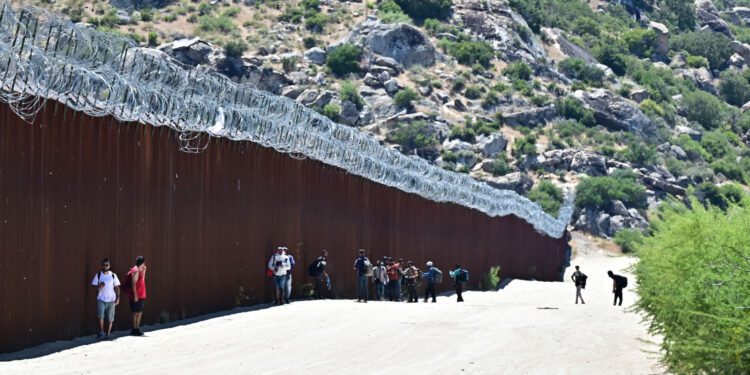When Vice President Kamala Harris strode along the United States’ southern border in Douglas, Arizona recently, she sought to draw voters’ attention to a tougher Democratic stance on immigration policy.
She claimed former President Donald Trump “did nothing to fix our broken immigration system” as president, and that Republicans offered a “false choice” between border security and a “safe, orderly, and humane” immigration system. “We can and must do both,” she said.
But Harris’ campaign event and photo op was only possible because the Chihuahuan desert backdrop behind her was as quiet as it has been in years.
Migrants walk into the United States beside the U.S.-Mexico border wall at Jacumba Hot Springs, California, on June 5.
Migrants walk into the United States beside the U.S.-Mexico border wall at Jacumba Hot Springs, California, on June 5.
FREDERIC J. BROWN/AFP via Getty Images
After reaching a record high in December 2023, the monthly number of U.S. Border Patrol encounters with migrants crossing the southern frontier has dropped by 77 percent overall—a stunningly sharp decline in a 9 month-period.
Since June executive orders limited the extent to which U.S. border officers will consider asylum claims—a likely violation of international and U.S. humanitarian law—the Biden Administration and Harris have been quick to take credit.
But the difference since last December is not only that prospective entrants are being turned away by U.S. law enforcement; it’s that these would-be asylum seekers are barely even approaching the border in the first place because Mexican officials are proactively intercepting them en route and transporting them to the southernmost reaches of the country.
Mexican authorities have reportedly been intercepting roughly 8,000 U.S.-bound migrants per day thanks to a mix of military patrols and highway checkpoints as part of a program Mexico launched at the request of American officials last year.
Its effect on the November election cannot be overstated.
Trump reportedly believes that voters’ dissatisfaction with border control will power his re-election on Nov. 5.
And when she became the Democratic Party’s nominee in August, Harris’ greatest political liability was her time as the unofficial “border czar” in the White House. Though she was never so ordained, President Joe Biden assigned Harris to lead an initiative addressing the root causes of irregular migration in 2021—an impossible file that became an albatross for her political ambitions.
In significantly alleviating what was a crisis mere months ago, the Mexicans have allowed Harris to neutralize her primary policy weakness and change the subject.
More than any Iranian email hack or Russian trolls on social media, this is the most significant form of “foreign influence” on the 2024 election to date. And it’s not a secret.
To be clear, the Mexican government has not ignored the U.S. border until now. They too are invested in order at their biggest trading partner’s 2,000-mile border, where hundreds of thousands of people cross each day to work, visit family, and attend school.
Former Mexican President Andrés Manuel López Obrador imposed visa restrictions on people from migrant-sending countries this year, he spent $1.5 billion to improve “smart” border technology two years ago, and the U.S. and Mexico have long worked together to combat drug trafficking and transnational crime.
But Mexico’s more aggressive patrols and interceptions, combined with the Biden administration’s revised asylum rules, have produced the greatest effect.
In his first term, former President Donald Trump destabilized US-Mexico cooperation, and diplomatic observers know that the Mexican government is wary of another four years of tension and “America First” unilateralism.
However, the takeaway here is not Mexico’s pro-Harris bias; it is that the only real way to make international migration more orderly is for sovereign nations to work together.
Indeed, if Donald Trump were serious about bringing greater order to the U.S. southern border, he would have engaged his counterparts to the south to produce the same results. Instead, Trump vilified Mexicans and pulled out of the United Nations’ 2018 Global Compact for Migration—a non-binding agreement in which 152 countries, including Mexico, agreed to broaden multilateral governance of people crossing borders. So, it’s not surprising that, after Trump’s four years in power, the challenges of border control persisted.
Although the Global Compact was no panacea, it at least was intended to facilitate more multinational cooperation to resolve a collective action problem in the face of escalating push factors like climate change, violence, and poverty in low-income countries.
In the absence of a broader regional partnership, today’s U.S.-Mexico partnership struggles to strike the balance between controlling flows and protecting migrants’ human rights.
The new American asylum rules, which the White House tightened this month, block asylum access when border enforcement encounters spike. This prevents people who claim to be fleeing persecution and humanitarian crises from receiving due process. Of equal concern, last week, Mexican soldiers opened fire on a truck carrying a group of international migrants near the border with Guatemala, leaving six migrants dead and 12 injured.
If more countries like Canada or Chile were to collaborate with the U.S. and Mexico in the future, they could pursue a burden-sharing arrangement that would not require such violations to relieve the border bottleneck. The Biden administration is actually beginning to assemble such a regional architecture of multilateral governance. And this month, Brazil imposed entry restrictions on some Asian nationals to prevent migration to the U.S.
But if countries try to govern migration alone, the Chihuahuan Desert will only get busier.
Justin Gest (@_JustinGest) is a Newsweek columnist. He is a professor and director of the Public Policy program at George Mason University’s Schar School of Policy and Government. He has authored six books on the politics of immigration and demographic change, including his newest, Majority Minority.
The views expressed in this article are the writer’s own.
Source link : http://www.bing.com/news/apiclick.aspx?ref=FexRss&aid=&tid=6717b3804a3b42f581adb3c3dcfaff51&url=https%3A%2F%2Fwww.newsweek.com%2Fmexico-influencing-us-election-its-not-secret-opinion-1972907&c=3093260485375443138&mkt=en-us
Author :
Publish date : 2024-10-22 03:03:00
Copyright for syndicated content belongs to the linked Source.






